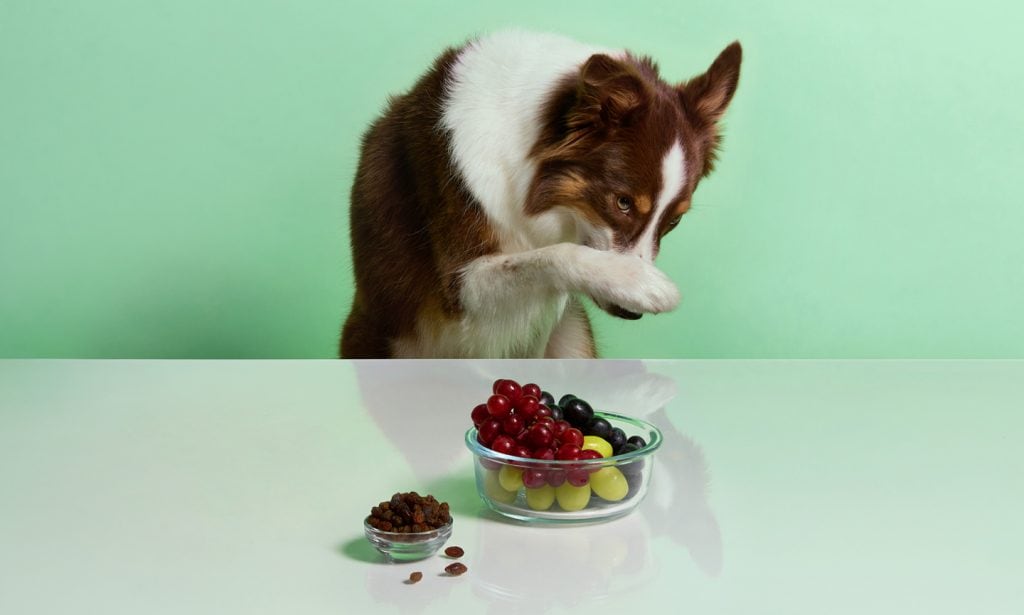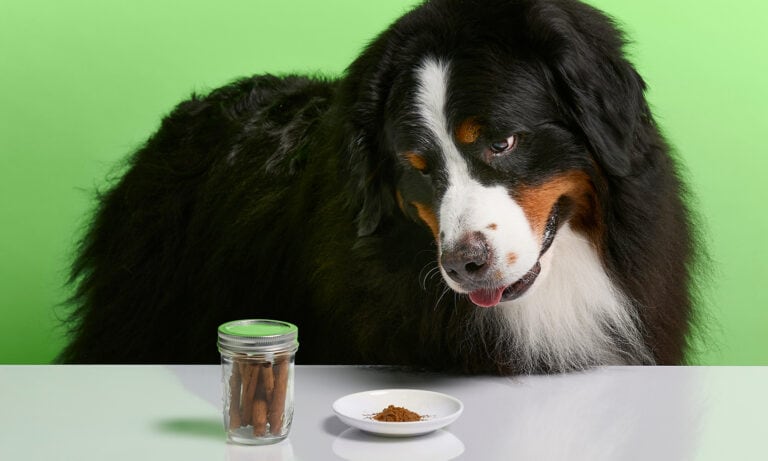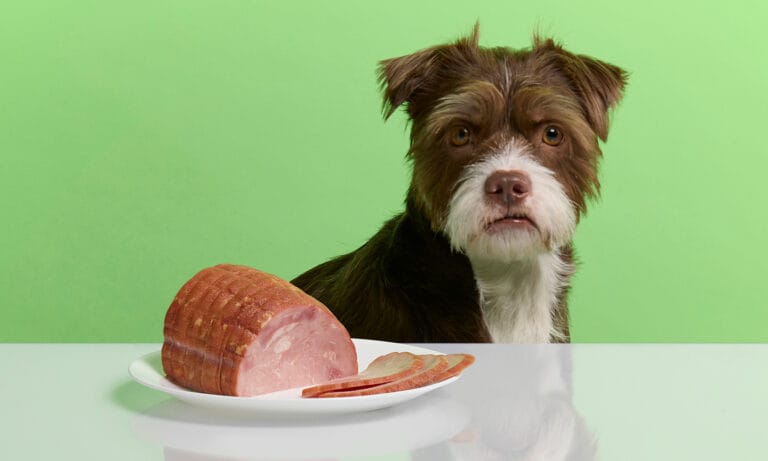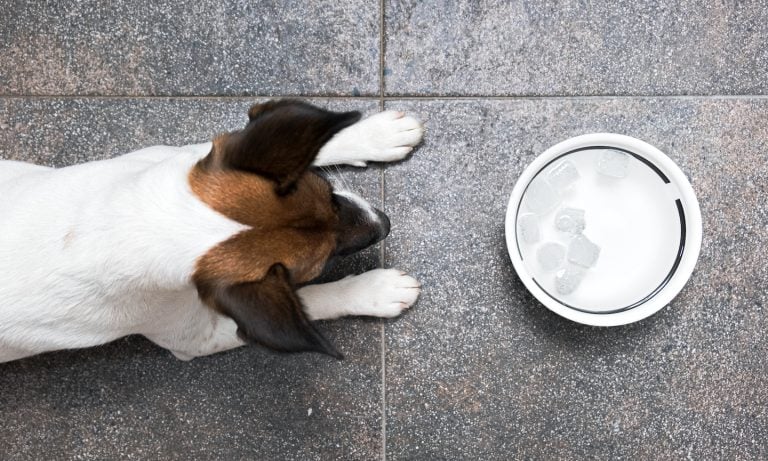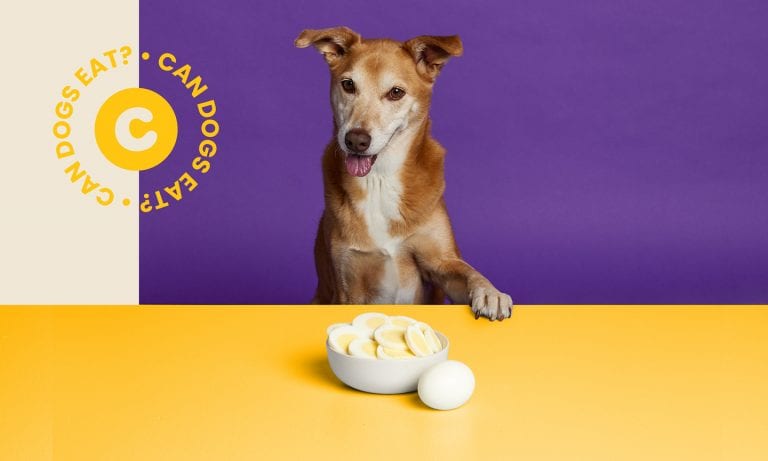No, grapes and raisins are NOT safe for dogs to eat.
While there are many fruits and vegetables that make delicious and nutritious treats for dogs, grapes and raisins are NOT among them. In fact, they’re often highly toxic to dogs even in small quantities, so pups should avoid eating them at all costs.
We spoke with several experts — including Dr. Alex Crow, a veterinarian at Buttercross Veterinary Centre; Dr. Jamie Whittenburg, founder of Kingsgate Animal Hospital; and Dr. Kelsey Bruno, instructor of animal nutrition at Northwest Missouri State University — to get all the facts about what makes grapes and raisins so dangerous and what to do if your dog eats any quantity.
Dangers of Grapes and Raisins for Dogs
Grapes and raisins are both highly toxic to dogs and can cause serious illness even if a pup eats only a small amount. While veterinarians don’t know exactly what substance in grapes and raisins causes this toxicity, recent evidence suggests tartaric acid and potassium bitartrate (cream of tartar) may be to blame.
Dr. Whittenburg says the main effect of eating grapes or raisins is on a dog’s kidneys and eating just a few can lead to acute kidney failure, requiring prompt medical treatment.
The most common symptoms of grape or raisin poisoning in a dog include:
- Lethargy or weakness
- Vomiting or diarrhea
- Increased drinking and urination (or no urine production)
- Abdominal pain
- Dehydration
- Bad or strong-smelling breath
- Neurological signs such as head tilts, dizziness, or seizures
However, due to genetic differences between dogs and varying amounts of the toxins in grapes and raisins, there’s no telling how any dog will react. Some will go into acute kidney failure after consuming a small amount, while others will have no side effects after eating a lot more. Since it’s impossible to predict what will happen, the best course of action is to keep all grapes and raisins out of paw’s reach.
Pet parents should also keep a close eye on their pup to make sure they don’t go counter-surfing for any foods that contain grapes or raisins, such as salads, cookies, and cakes. Beyond the toxicity of grapes and raisins, these foods often have added ingredients like high amounts of sugar that can also cause problems.
What to Do If Your Dog Eats Grapes or Raisins
Symptoms of grape or raisin poisoning typically appear within 6-12 hours after consumption. If your dog experiences any of the above symptoms, call your veterinarian immediately. However, if you see your dog eat a small amount of grapes or raisins, don’t wait for symptoms to appear. Even if your dog seems to be fine, it’s best to call your vet as a precaution. (If you need help finding a vet near you use this link.)
Here are some things your veterinarian may do once you’re at their office.
- Your vet may want to induce vomiting. This is to help get as many grapes or raisins out of your dog’s system as possible. (Never do this on your own unless advised by a vet!)
- Conduct a blood test. This will be useful in assessing kidney function.
- Put your pup on fluids. This will help flush any toxins out of their system.
Frequently Asked Questions
Q:Are grapes poisonous to dogs?
A:Yes, grapes have the potential to be very poisonous to dogs, even in small quantities. Avoid feeding them to your dog altogether.
Q:Can dogs have grape juice?
A:No, you should not feed your dog grape juice since it is derived from grapes, so it can also be toxic. Even juices that are grape-flavored could be harmful.
Q:Can dogs eat frozen grapes?
A:No, frozen grapes will contain the same toxins and could also present a choking hazard to your dog.
Q:Can dogs eat grape jelly or jam?
A:Again, the answer is no. Grape jelly and jam are made from grapes and so will contain the same toxic substances found in the whole fruit.
Expert input provided by Dr. Alex Crow, a veterinarian at Buttercross Veterinary Centre; Dr. Jamie Whittenburg, founder of Kingsgate Animal Hospital; and Dr. Kelsey Bruno, instructor of animal nutrition at Northwest Missouri State University.
Share:
